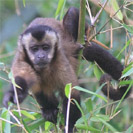Get
To Know
|
 The
Brown Capuchin Monkey is a New
World primate who lives
in the northern Amazon rainforest of the Guyanas, Venezuela and Brazil.
They are also found in eastern Colombia, Ecuador, Peru, including the
upper Andean Magdalena valley in Colombia, and a population was established
in the Republic of "Trinidad and Tobago". The capuchin has a head-body
length of 32 to 57 centimetres and a weight of 1.9 to 4.8 kilograms and
mostly
eats fruit, insects, larvae, eggs, young birds, frogs, lizards, and even
bats. They are also known to chase cats. They
can be found in many different kinds of environment, including moist tropical
and subtropical forest, dry forest, and disturbed or secondary forest.
They are social, and form groups of 8 to 15 individuals that are led by
an alpha male. Important
natural enemies of the capuchin are large birds of prey who they are so
afraid of that they even become alarmed when a harmless bird flies over.
The capuchin rubs urine on its hands and feet in order to attract mates
and reduce stress. They also use stones and sticks as tools. One population
of this species uses stones as a tool to open hard nuts. The monkey lays
the nut on a large, flat rock or fallen tree, hammering the nut with a
suitable stone until the nut cracks. The anvil rock is often pock-marked
with hollows as a result of repeated use. They have also
been observed using containers to hold water, using sticks (to dig nuts,
to dip for syrup, and to catch ants), using sponges to absorb juice, using
stones as hammer and chisel to penetrate a barrier, and using stones as
hammer and anvil to crack nuts. Some of these tasks seem relatively simple
by cognitive standards, but others, like cracking nuts with hammer and
anvil, are only exceeded in complexity by chimpanzees and some humans. The
Brown Capuchin Monkey is a New
World primate who lives
in the northern Amazon rainforest of the Guyanas, Venezuela and Brazil.
They are also found in eastern Colombia, Ecuador, Peru, including the
upper Andean Magdalena valley in Colombia, and a population was established
in the Republic of "Trinidad and Tobago". The capuchin has a head-body
length of 32 to 57 centimetres and a weight of 1.9 to 4.8 kilograms and
mostly
eats fruit, insects, larvae, eggs, young birds, frogs, lizards, and even
bats. They are also known to chase cats. They
can be found in many different kinds of environment, including moist tropical
and subtropical forest, dry forest, and disturbed or secondary forest.
They are social, and form groups of 8 to 15 individuals that are led by
an alpha male. Important
natural enemies of the capuchin are large birds of prey who they are so
afraid of that they even become alarmed when a harmless bird flies over.
The capuchin rubs urine on its hands and feet in order to attract mates
and reduce stress. They also use stones and sticks as tools. One population
of this species uses stones as a tool to open hard nuts. The monkey lays
the nut on a large, flat rock or fallen tree, hammering the nut with a
suitable stone until the nut cracks. The anvil rock is often pock-marked
with hollows as a result of repeated use. They have also
been observed using containers to hold water, using sticks (to dig nuts,
to dip for syrup, and to catch ants), using sponges to absorb juice, using
stones as hammer and chisel to penetrate a barrier, and using stones as
hammer and anvil to crack nuts. Some of these tasks seem relatively simple
by cognitive standards, but others, like cracking nuts with hammer and
anvil, are only exceeded in complexity by chimpanzees and some humans.
|
|
|
|
A ragged woman wears sweatpants and settles
into her government issue chair,
hoists her belly up
and rests it on her knees.
"Aw, shit,"
she rasps. Jasmine Jackson
has sparkling nails, straight out of a magazine,
and hair relaxed to mermaid sheen. She stands
beside me in the hall, laughs velvet. She is selected
and then dismissed, after being unable
to answer the prosecution, "What is
justice?" A tiny bird woman
perches at the end of the row, delicate
beyond measure, her thin nose
swoops up in jubilee, silver hair
swept back with pins, glimmers. She prefers
privacy when she tells the council
why she is unfit to judge
the case. The ceiling
is perforated. I try to pay attention
to the judge's sad jokes, the plaintiff's
fumbled indignations. The pony-tail guy
and several of the smiling obese
have been dismissed.
In the hallway
a bloodless black woman
walks past
shackled,
in a pants-suit,
not seeing
a single
one
of us.
Jessica Morey-Collins grew up in Southern California's Inland Empire.
Her work has been featured in Welter, Bellow, Poetry Quarterly, The
Smoking Poet and elsewhere. She is also one winner of The Wild Lemon
Project's 2012 Sense of Place Poetry Prize.
|
 The
Brown Capuchin Monkey
- Issue Thirteen
The
Brown Capuchin Monkey
- Issue Thirteen